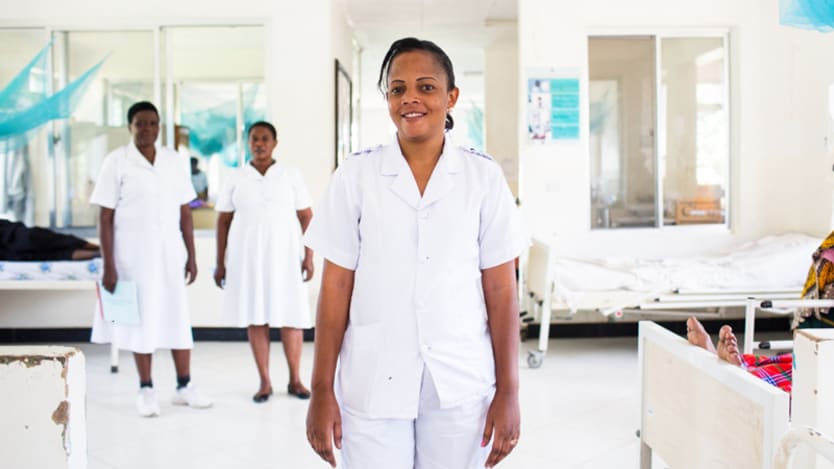
If you had asked me back when I started my career what I found most exciting about the future of global health, I would have told you about my dream that primary health care would someday be available to all.
But today, my answer to that question is a bit different. Global health has radically improved since those days, and I believe more than ever that universal access to primary health care is within our reach. Now when I look to the future — to the day when we’ve achieved our Sustainable Development Goals and made health coverage truly universal — I dream of an even healthier global population with unprecedented options for care.
I see a robust global middle class with greater purchasing power than ever. I see domestically financed health systems and mixed markets where the public and private sectors offer multiple points of access to an array of comprehensive health services. And I see communities educated and able to focus on self-care, while health workers provide high-quality, sustainable, patient-centered services to all those in need.
But how will we reach this future? And how can we afford it?
Before we even set foot on this path, politicians and policymakers must first accept that spending on health is not merely a cost — it’s an investment. For every dollar invested in community health workers, for example, we see returns as high as $10.
The first step will be investing today in the health workforce, where huge funding gaps remain. Take community health workers — 80 percent of populations rely on them for primary health care, and yet many in the global health and development community continue to see them as volunteers. Governments, donor agencies and others don’t budget and plan for their integration into the formal health system.
We can expand and leverage our investments in health systems and the workforce for sustainable returns by:
1. Reforming preservice education for health workers.
Too often, health education focuses on specialized, hospital-based care. Shifting the focus to primary health care and adding health system leadership and governance to the curricula will help countries build fit-for-purpose workforces.
2. Investing in youth.
The health sector is a huge employer. By ensuring young people who are interested in becoming health workers have access to education, and by focusing on employment and job creation for young people, we will yield sustainable returns.
3. Advocating for more favorable health policies.
This includes those that support front-line teams of health workers, de-medicalize care by promoting task-sharing, and expand education for self-care.
4. Bringing more voices and partnerships to the table.
Governments must become more open to outsourcing and contracting certain functions to the private sector — and to bringing economists, financiers and other new stakeholders into the fold.
Africa in particular has great potential for new market solutions. And there are some excellent domestic health financing models now being tried in low- and middle-income countries that could be expanded.
“If we start by collaborating to lay the groundwork for strong health systems and workforces around the world, we’ll be on our way to a future of better health and prosperity for all.”
— Pape Gaye, president and CEO, IntraHealth InternationalIn Namibia, for example, IntraHealth International has been working with the government to update staffing norms for health facilities by implementing the first-ever national application of the World Health Organization’s Workload Indicators of Staffing Need method. This is helping the government pinpoint staff shortages and misalignments down to the individual facility — and then make budgeting and deployment decisions accordingly.
Other great examples include the entrepreneurial and door-to-door approaches of Living Goods and the HealthKeepers Network, and The Abraaj Group’s investments in networks of private-sector health facilities linked with frontline health workers.
We also know it’s possible to raise revenue for the health sector through so-called sin taxes, such as on alcohol and tobacco. According to the WHO, raising the tax on cigarettes by one “international dollar” per pack would raise cigarette excise revenue worldwide by about $141 billion and decrease global cigarette consumption by about 18 percent.
The ‘evolving role’ of international donors and partners
International donors and development partners must change the way we work and the value we provide as we move toward more LMICs financing their own health sectors.
How will we get there?
First, we will have to advocate for stellar global and national governance, holding global agencies and countries accountable for developing, financing, and implementing evidence-based policies and programs. Secondly, we should liaise with the private sector to identify innovative solutions and investments that make health care more accessible and affordable to all. And thirdly, we must provide state-of-the-art technical assistance, helping countries translate academic research into sound, context-specific policy and practice.
The global health of tomorrow relies on investments made today. If we start by collaborating to lay the groundwork for strong health systems and workforces around the world, we’ll be on our way to a future of better health and prosperity for all.
Making Markets Work is an online conversation to explore what’s being done to make global health care markets accessible to people at the base of the pyramid. Over 10 weeks, we will amplify the discussion around effective health financing, analyze key challenges blocking universal market access in the health care supply chain, and explore the key strategies to make markets more effective. Join us as we look at this important issue, and share your thoughts by tagging #MakingMarketsWork and @Devex.








